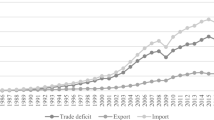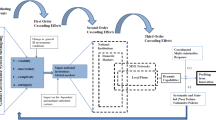Abstract
This paper suggests that while the static welfare losses of merger predilections among Western firms may not be dramatic, they may lead to substantial dynamic losses when merger-prone firms need to compete with firms which instead focus on equipment investment and investments in R&D. It is suggested that such diverging investment priorities have been the real cause of the deteriorating competitiveness of many of the largest Western enterprises vis-à-vis their Japanese rivals. While mergers are generally taken to be determined by either efficiency or monopoly considerations, this paper argues that Western merger predilections are likely to be generated by a combination of imitative and defensive routines as well. That would make it difficult for firms to unilaterally break away from these competitiveness-threatening investments. If correct, this would imply that competition policies would need to be refocused. However, it is also suggested that the implications for international competitiveness should make merger questions a subject of industrial policies too. In that respect, the paper suggests some basic attitudinal changes.
Similar content being viewed by others


References
Abrahamson, E. (1991) ‘Managerial Fads and Fashions: The Diffusion and Rejection of Innovations’,Academy of Management Review 16(3), 586–612.
Acs, Zoltan, J., and David B. Audretsch (eds.) (1990a)The Economics of Small Firms. A European Challenge. Dordrecht/Boston/London: Kluwer Academic Publishers.
Acs, Zoltan J., and David B. Audretsch (1990b) ‘Small Firms in the 1990s’, in Z. J. Acs and D. B. Audretsch (eds.), (1990a), pp. 1–22.
Adams, W. and J. W. Brock (1988) “The Bigness Mystique and the Merger Policy Debate: An International Perspective’,Northwestern Journal of International Law & Business 9(1), 1–48.
Allais, M. (1953) ‘Le Comportement de l'Homme Rationel Devant la Risque; Critique des Postulats et Axiomes de l'École Américaine’,Econometrica 21, 503–546.
Arthur, W. B. (1989) ‘Competing Technologies, Increasing Returns, and Lock-In by Historical Events’,Economic Journal 99, 116–131.
Banerjee, A. V. (1992) ‘A Simple Model of Herd Behavior’,Quarterly Journal of Economics CVII(3), 797–817.
Berger, A. N., and D. B. Humphrey (1992) ‘Megamergers in Banking and the Use of Cost Efficiency as an Antitrust Defense’,Antitrust Bulletin 37, 541–600.
Bikhchandani, S., D. Hirshleifer, and I. Welch (1992) ‘A Theory of Fads, Fashions, Custom, and Cultural Change as Informational Cascades’,Journal of Political Economy 100(5), 992–1026.
Bishop, Matthew, and John Kay (eds.) (1993)European Mergers and Merger Policy. Oxford: Oxford University Press.
Bühner, R. (1991) ‘The Success of Mergers in Germany’,International Journal of Industrial Organization 9(4), 513–543.
Carlsson, Bo (1987) ‘Reflections on “Industrial Dynamics”, The Challenges Ahead’,International Journal of Industrial Organization 5(2), 135–148.
Cowling, Keith, Paul Stoneman, J. Cubbin, John Cable, Graham Hall, S. Domberger, and P. Dutton (1980)Mergers and Economic Performance. Cambridge: Cambridge University Press.
Cowling, Keith, and Roger Sugden (eds.) (1992)Current Issues in Industrial Economic Strategy. Manchester/New York: Manchester University Press.
Cyert, R. M., and J. G. March (1963)A Behavioral Theory of the Firm, 2nd ed. 1992. Cambridge, MA: Blackwell.
Dankbaar, Ben, John Groenewegen, and Hans Schenk (eds.) (1990)Perspectives in Industrial Organization, Studies in Industrial Organization, Vol. 13, Dordrecht/Boston/London: Kluwer Academic Publishers.
Den Hartog, H., K. A. Heineken, Bert Minne, R. J. J. Roemers, and H. J. Roodenburg (1986) Investment in the Netherlands (in Dutch),Research Memorandum, no. 17, The Hague: Central Planning Bureau.
Dietrich, Michael (1992) ‘The Foundations of Industrial Policy’, in K. Cowling and R. Sugden (eds.), pp. 16–32.
Dietrich, Michael, and Hans Schenk (1995) ‘Co-Ordination Benefits, Lock-in, and Strategy Bias’,Management Report, no. 220, Rotterdam: Rotterdam School of Management, Erasmus University Rotterdam.
DiMaggio, P. J., and W. W. Powell (1983), ‘The Iron Cage Revisited: Institutional Isomorphism and Collective Rationality in Organizational Fields’,American Sociological Review 48, 147–160.
Dollar, D., and E. N. Wolff (1993),Competitiveness, Convergence, and International Specialization, Cambridge, MA: MIT Press.
Dutch Ministry of Economic Affairs (1995)Knowledge on the Move (in Dutch), The Hague: Ministry of Economic Affairs.
Earl, P. E. (1995)Microeconomics for Business and Marketing. Aldershot: Edward Elgar.
EC, Commission of the European Communities (1988), The Economics of 1992,European Economy 35.
Fortune (1979, 1982, 1985, 1988, 1991), The Fortune International 500,Fortune International, July/August editions.
Franks, J. and R. Harris (1993), ‘Shareholder Wealth Effects of UK Take-overs: Implications for Merger Policy’, in M. Bishop and J. Kay (eds.), pp. 134–161.
George, Ken, and Alexis Jacquemin (1990) ‘Competition Policy in the European Community’,Discussion Paper, 90-03, Swansea: University College of Swansea, Department of Economics.
Geroski, Paul A. (1984) ‘On the Relationship between Aggregate Merger Activity and the Stock Market’,European Economic Review 25, 223–233.
Geroski, Paul A. (1989) ‘European Industrial Policy and Industrial Policy in Europe’,Oxford Review of Economic Policy 5(2), 20–36
Greer, D. F. (1986) ‘Acquiring in Order to Avoid Acquisition’,Antitrust Bulletin, Spring, 155–186.
Hannan, M. T. and J. Freeman (1977) ‘The Population Ecology of Organizations’,American Journal of Sociology 82(5), 929–964.
Haspeslagh, Ph. C. and D. B. Jemison (1991)Managing Acquisitions. Creating Value Through Corporate Renewal. New York: Free Press.
Healy, P. M., K. G. Pelapu, and R. S. Ruback (1992), ‘Does Corporate Performance Improve After Mergers?,Journal of Financial Economics 31, 135–175.
Hitt, M. A., R. E. Hoskisson, R. D. Ireland, and J. S. Harrison (1991) ‘Effects of Acquisitions on R&D Inputs and Outputs’,Academy of Management Journal 34(3), 693–706.
Hughes, Alan (1992) ‘Competition Policy and the Competitive Process: Europe in the 1990s’,Metroeconomica 43(1/2), 1–48.
Hughes, Alan (1993) ‘Mergers and Economic Performance in the UK: A Survey of the Empirical Evidence 1950–1990’, in M. Bishop and J. Kay (eds.), pp. 9–95.
Hughes, Kirsty S., ed. (1993)European Competitiveness. Cambridge: Cambridge University Press.
Jacobs, M. T. (1991)Short-term America, The Causes and Cures of Our Business Myopia. Boston, MA: Harvard Business School Press.
Jacquemin, Alexis P., Pierre Buigues, and Fabienne Ilzkovitz (1989) ‘Horizontal Mergers and Competition Policy in the European Community’,European Economy 40, 1–95.
Jensen, M. C. (1988) ‘Takeovers: Their Causes and Consequences’,Journal of Economic Perspectives 2(1), 21–48.
Johnson, Ch. (1984) ‘The Industrial Policy Debate Re-examined’,California Management Review 27(1), 71–89.
Kahneman, D. and A. Tversky (1979), ‘Prospect Theory: An Analysis of Decision Making Under Risk’,Econometrica 47(2), 263–291.
Katona, G. (1951)Psychological Analysis of Economic Behavior. New York: McGraw-Hill.
Kay, John A. (1993)Foundations of Corporate Success. Oxford: Oxford University Press.
Kay, N. (1993) ‘Mergers, Acquisitions and the Completion of the Internal Market’, in K. Hughes (ed.), pp. 161–180.
Kende, Michael (1996) ‘Government Support of the European Information Technology Industry’,Paper, CEPR/WZB Workshop ‘Does Europe have an Industrial Policy?’, Berlin, 19–20 April.
Keynes, J. M. (1936)The General Theory of Employment, Interest, and Money, London: Macmillan.
Keynes, J. M. (1973)The Collected Writings of John Maynard Keynes XIV. London: Macmillan.
Knickerbocker, F. T. (1973)Oligopolistic Reaction and Multinational Enterprise. Boston: Division of Research, Harvard Business School.
Kreps, D. M. (1990)A Course in Microeconomic Theory. London: Harvester Wheatsheaf.
Maddison, Angus (1987) ‘Growth and Slowdown in Advanced Capitalist Economies: Techniques of Quantitative Assessment’,Journal of Economic Literature 25, 649–698.
March, J. G. (1978) ‘Bounded Rationality, Ambiguity, and the Engineering of Choice’,Bell Journal of Economics 9, 587–608.
March, J. G., and H. A. Simon (1993) ‘Organizations Revisited’,Industrial and Corporate Change 2(3), 299–316.
Marchipont, J.-F. (1995) ‘La stratégie industrielle de l'Union européenne: a la recherche d'un concept de politique de compétitivité globale’,Revue d'Économie Industrielle 71, 17–37.
Marris, Robin (1964)The Economic Theory of ‘Managerial’ Capitalism. London: Macmillan.
Marris, Robin (1990) ‘Some Challenges for Industrial Economics’, in B. Dankbaar, J. Groenewegen, and H. Schenk (eds.), pp. 41–62.
Mboweni, Tito (ed.) (1993)Antitrust, Monopolies, and Mergers. Johannesburg: UWC Press.
Meeks, G. (1977)Disappointing Marriage: A Study of the Gains from Merger. Cambridge: Cambridge University Press.
Michie, Jonathan (ed.) (1992)The Economic Legacy 1979–1992. London: Academic Press.
Montgomery, C. A. (ed.) (1995)Resource-Based and Evolutionary Theories of the Firm: Towards a Synthesis. Boston/Dordrecht/London: Kluwer Academic Publishers.
Morgan, Eleanor J. (1996) ‘The Treatment of Oligopoly under the European Merger Control Regulation’,Antitrust Bulletin, forthcoming.
Mueller, Dennis C. (ed.) (1980)The Determinants and Effects of Mergers. An International Comparison. Cambridge, MA: Oelgeschlager, Gunn & Hain.
Mueller, Dennis C. (1986),Profits in the Long Run. Cambridge/New York: Cambridge University Press.
Mueller, Dennis C. (1989) ‘Mergers: Causes, Effects and Policies’,International Journal of Industrial Organization 7(1), 1–10.
Mueller, Dennis C (1993) ‘U.S. Merger Policy and the 1992 Merger Guidelines’,Review of Industrial Organization 8, 151–162.
Mueller, Dennis C (1996) ‘Lessons from the United States's Antitrust History’,International Journal of Industrial Organization 14(4), 415–445.
Neumann, Manfred (1990) ‘Industrial Policy and Competition Policy’,European Economic Review 34, 562–567.
Odagiri, Hiroyuki (1992)Growth through Competition, Competition through Growth. Strategic Management and the Economy in Japan. Oxford: Oxford University Press/Clarendon.
OECD (1992),Competition Policy in OECD Countries, 1989–1990. Paris: Organisation for Economic Co-Operation and Development.
Olshavsky, R. W., and D. H. Granbois (1979) ‘Consumer Decision Making — Fact or Fiction?’,Journal of Consumer Research 6, 93–100.
Ravenscraft, D. J. and F. Michael Scherer (1987)Mergers, Sell-offs, and Economic Efficiency. Washington, D.C.: Brookings Institution.
Rhoades, S. A. (1993) ‘Efficiency Effects of Horizontal (In-market) Bank Mergers’,Journal of Banking and Finance 17(2/3), 411–422.
Roll, R. (1986) ‘The Hubris Hypothesis of Corporate Takeovers’,Journal of Business 59(2), 197–216.
Savage, L. J. (1951) ‘The Theory of Statistical Decision’,Journal of the American Statistical Association 46, 55–67.
Scharfstein, D. S., and J. C. Stein (1990), ‘Herd Behavior and Investment’,American Economic Review 80(3), 465–479.
Schelling, T. (1960)The Strategy of Conflict. Cambridge MA: Harvard University Press.
Schenk, Hans (ed.) (1987a)Industrial and Technology Policy: Analysis and Perspectives (in Dutch). Groningen. Wolters-Noordhoff.
Schenk, Hans (1987b), ‘Industrial Policy in Japan: Cross-Pollination of Intervention and Competition’ (in Dutch), in H. Schenk (ed.) (1987a), pp. 173–220.
Schenk, Hans (1992) ‘Some Comments on the Competitive Strategy Aspects of Industrial Policy’, in K. Cowling and R. Sugden (eds.), pp. 33–53.
Schenk, Hans (1993), ‘West-European Industrial and Competition Policies: Content and Assessment’, in T. Mboweni (ed.), pp. 1–39.
Schenk, Hans (1997)Mergers, Efficient Choice, and International Competitiveness. Aldershot: Edward Elgar (forthcoming).
Scherer, F. Michael (1984)Innovation and Growth: Schumpeterian Perspectives. Cambridge, Mass.: MIT Press.
Scherer, F. Michael (1996) ‘Competition Policy Convergence: Where Next?’,NÖG-lecture 1996, Austrian Economic Association, Vienna, 21 June.
Simon, J. L., M. Mokhtari, and D. H. Simon (1996), ‘Are Mergers Beneficial or Detrimental? Evidence from Advertising Agencies’,International Journal of the Economics of Business 3(1), 69–82.
Thomas, L. G. (1994) ‘Implicit Industrial Policy: The Triumph of Britain and the Failure of France in Global Pharmaceuticals’,Industrial and Corporate Change 3(2), 451–489.
Van Tulder, Rob (1990) ‘Dutch Dilemmas: the Netherlands and European Technology Programmes’,Internationale Spectator xliv(11), 671–678.
Author information
Authors and Affiliations
Rights and permissions
About this article
Cite this article
Schenk, H. Bandwagon mergers, international competitiveness, and government policy. Empirica 23, 255–278 (1996). https://doi.org/10.1007/BF00924973
Issue Date:
DOI: https://doi.org/10.1007/BF00924973


